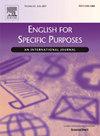Stance taking through that-clauses in research article abstracts: Cross-cultural and cross-disciplinary practices in translated and non-translated English
IF 2.7
1区 文学
Q1 LINGUISTICS
引用次数: 0
Abstract
This corpus-based study provides cross-cultural and cross-disciplinary insights into stance-taking expression through controlling words in that-clauses within the English as lingua franca (ELF) academic context. It compares translated (from Chinese) and non-translated ELF discursive practices in research article abstracts (RAAs) in applied linguistics (AL) and medical sciences (MS), focusing on the frequency, semantic classes (communication, certainty, likelihood, and attitude), and diversity of controlling words. The results reveal a shared preference for verb forms of controlling words across disciplines and practices, along with a consistent disciplinary convention of higher frequency of that-clauses in AL than MS within each discursive practice. Further analysis indicates that translated discourses exhibit a higher frequency of that-clauses in both disciplines and rely on certain words indicating certainty or communication, suggesting cross-cultural constraints in translated practices. However, these constraints manifest differently in the two disciplines compared to their non-translated counterparts. Scholars in non-translated practices prefer communication and certainty words, a preference seen only in translated AL, not in MS. Additionally, lexical diversity of these controlling words shows minimal differences between translated and non-translated ELF practices in AL, but significant divergences in MS. These findings can inform literacy brokers and English for research publication instructors, enhancing multilingual academic communication.
通过研究论文摘要that从句的立场:翻译和非翻译英语中的跨文化和跨学科实践
这项基于语料库的研究通过在通用英语(ELF)学术背景下控制that从句中的单词,为立场表达提供了跨文化和跨学科的见解。比较了应用语言学(AL)和医学科学(MS)研究论文摘要中翻译(中文)和未翻译的ELF话语实践,重点关注控制词的频率、语义类别(交流、确定性、可能性和态度)和多样性。结果表明,在不同学科和实践中,人们对动词形式的控制词有共同的偏好,并且在每个话语实践中,ai中that-从句的频率高于MS,这是一致的学科惯例。进一步分析表明,翻译后的语篇在这两个学科中使用that-从句的频率更高,并且依赖于某些表示确定性或交流的词,这表明翻译实践中存在跨文化约束。然而,这些限制在两个学科中表现得与非翻译的同行不同。非翻译实践的学者更倾向于交流和确定性词,这种偏好只在翻译的人工智能中出现,在ms中没有。此外,这些控制词的词汇多样性在翻译的人工智能和非翻译的人工智能实践中差异很小,但在ms中差异很大。这些发现可以为识字经纪人和研究出版讲师的英语提供信息,加强多语言学术交流。
本文章由计算机程序翻译,如有差异,请以英文原文为准。
求助全文
约1分钟内获得全文
求助全文
来源期刊

English for Specific Purposes
LINGUISTICS-
CiteScore
5.70
自引率
8.00%
发文量
41
审稿时长
62 days
期刊介绍:
English For Specific Purposes is an international peer-reviewed journal that welcomes submissions from across the world. Authors are encouraged to submit articles and research/discussion notes on topics relevant to the teaching and learning of discourse for specific communities: academic, occupational, or otherwise specialized. Topics such as the following may be treated from the perspective of English for specific purposes: second language acquisition in specialized contexts, needs assessment, curriculum development and evaluation, materials preparation, discourse analysis, descriptions of specialized varieties of English.
 求助内容:
求助内容: 应助结果提醒方式:
应助结果提醒方式:


